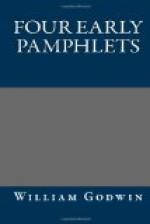Under the restrictions I have laid down, history is of all sciences the most simple. It has been ever considered by philosophers, as the porch of knowledge. It has ever been treated by men of literature, as the relaxation of their feverer pursuits. It leads directly to the most important of all attainments, the knowledge of the heart. It introduces us, without expence, and without danger, to an acquaintance with manners and society. By the most natural advances it points us forward to all the depths of science. With the most attractive blandishments it forms us by degrees to an inextinguishable thirst of literature.
But there is still an objection remaining, and that the most important of all. Let history be stripped as much as you will of every extraneous circumstance, let it be narrowed to the utmost simplicity, there is still one science previously necessary. It is that of morals. If you see nothing in human conduct, but purely the exterior and physical movements, what is it that history teaches? Absolutely nothing; and the science devoid of interest, becomes incapable of affording either pleasure or instruction. We may add, that the more perfectly it is made a science of character and biography, the more indispensible is ethical examination. But to such an examination it has been doubted whether the understandings of children be competent. Upon this question I will beg leave to say a few words, and I have done.
It is scarcely necessary to observe, that I do not speak here of ethics as an abstract science, but simply as it relates to practice, and the oeconomy of human life. Our enquiry therefore is respecting the time at which that intuitive faculty is generally awakened, by which we decide upon the differences of virtue and vice, and are impelled to applaud the one, and condemn the other.
The moment in which the faculty of memory begins to unfold itself, the man begins to exist as a moral being. Not long posterior to this, is the commencement of prescience and foresight. Rousseau has told us, in his animated language, that if a child could escape a whipping, or obtain a paper of sweetmeats, by promising to throw himself out at window tomorrow, the promise would instantly be made. Nothing is more contrary to experience than this. It is true, death, or any such evils, of which he has no clear conception, do not strongly affect him in prospect. But by the view of that which is palpable and striking, he is as much influenced as any man, however extensive his knowledge, however large his experience. It is only by seizing upon the activity and earnestness incident to youthful pursuits, and totally banishing the idea of what is future, that we can destroy its influence. Their minds, like a sheet of white paper, are susceptible to every impression. Their brain, uncrouded with a thousand confused traces, is a cause, that every impression they receive is strong and durable.




